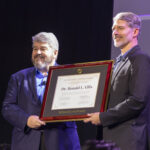Provider Food Service officials at California Baptist University are committed to reducing food waste and need students to play their part by making better decisions at the counter.
Kipp Dougherty, Provider director of food services, aims to throw away as little food as possible. The Alumni Dining Columns is the busiest location on campus and waste management is important.
“The art and skill of what we do is planning so that we don’t have waste,” Dougherty said.
The cafeteria employs a strategy of cross-utilizing ingredients, which focuses on cooking food that can be reused for meals the following day.
If two trays of cooked rice remain at the end of the night, they will be put into a blast chiller and cooked into fried rice the next day.
Dougherty said menus are planned with waste-management in mind and fried rice is one popular dish that involves no waste.
Dougherty and the cooking staff try to reuse as much leftover food as possible, although some waste is inevitable.
Food brought out to be served must be either consumed or disposed of. Provider used to partner with the Office of Spiritual Life to donate as much leftover food as possible. At the end of the night, the cooking staff would gather the food and label it, and OSL would take it to places such as Path of Life and homeless shelters in Riverside.
However, the program eventually ended a few years ago because of a lack of resources and the inconsistency in the food being picked up.
“It kills me to throw anything out,” Dougherty said. “I love the idea of taking leftovers to the homeless shelter. We would be 150 percent open to start that up again.”
While Provider does everything possible behind the counter to reduce waste, the bulk of waste happens on the student side.
“We can only control waste from the standpoint of anything that is left over,” Dougherty said. “We can’t control whether students take all the different items and take one bite of each.”
In 2010 Associated Students of California Baptist University helped raise waste awareness. As students returned trays they were required to scrape all uneaten food into bins and see their personal food waste.
A study was conducted over three days in three months. The first day saw more than 500 pounds of food wasted. Two months later, waste had reduced to just over 400 pounds the day the study was conducted.
Dougherty and her staff do what they can to manage waste. Smaller plate sizes, “just-in-time” cooking and creative meal planning for re-use are approaches taken. Still, much of the waste results from decisions students make when selecting food.
When made aware of the waste, students said they are going to be more responsible when loading their trays.
“I think (Provider) has done everything in their power to help reduce food waste,” said Nicole Berry, senior psychology and sociology double major. “Now it is up to us as students to try to reduce the waste as well. Personally I will try to be more conscious of what I take from each station.”
Berry also said she hopes the homeless shelter food program can begin again.
“Knowing that we, the students, waste 500 pounds of food a day encouraged me to only take the amount of food necessary,” said Lina Medeiros, sophomore kinesiology major.” Students really need to be more aware of the food we are wasting and change our habits.”
“Take one or two plates at a time,” Dougherty said to suggest ways to reduce waste. “Go, eat that and see how you feel. You can come back as many times as you want.”
Together, the Provider staff and students can combine forces to reduce the amount of food wasted.


